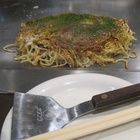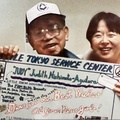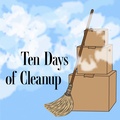We have only forty-eight hours to bring Hiroshima World to Manhattan. I take that back. Now forty-seven hours.
We’re turning our apartment—well, our apartment for the next forty-seven hours—into a most magical traveling adventure to our hometown, Hiroshima.
My best friend Risa has hand drawn the invitations and used her department’s photocopy machine to do some guerrilla printing. (Not that easy because she needed to steal the code.) She’s taken photos of the invitation with her phone and posted it all over social media.
If she’s doing all of that, what am I doing? I’m in charge of all the food. So okonomiyaki, of course, the tastiest savory pancake ever. I’ve made coffee jelly and red bean cookies in the shape of the maple leaf, the symbol of Miyajima. And plenty of cold barley tea.
I need to get the sliced pork for okonomiyaki and of course, will purchase it from Deep’s Butcher Shop in East Harlem, Tamio’s place. The next morning I decide to walk there, leaving invitations at every coffee house, library, and art gallery that I pass.
“Is this some kind of peace event?” one person asks me at a bakery.
I shake my head. “Not peace, but love. It’s all about love.”
And we’re planning to include everything that we love about Hiroshima. The baseball team, Hiroshima Carp, a bright red carp jumping from the ashes of the blast. The Hondori, the covered shopping area. The red torii of Miyajima. Ujina, the port across from Ninoshima. And, of course, Sadako’s cranes. Risa has included all of that in our handbills. Although she’s created some magnificent promotions for the student plays that she’s worked on at NYU, the Hiroshima World artwork is among her best.
When I arrive at Deep’s, Tamio is alone, cleaning his knives.
Unlike my first visit here, he is happy to see me. “What are you up to?” he asks me.
I tell him everything. That this is our last hurrah to the Upper East Side near NYU and maybe to New York City.
Maybe we can at least get enough for Risa to rent a room somewhere. As for me, this may be my last days in the U.S. of A. I’m not going to leave quietly, but with a big bang. I’m from Hiroshima, after all.
“Let me help you,” he says. He tells me that he will donate all the meat—and that includes the silkiest of silkiest slices of pork from a local farm. “No matter what happens, I’m here for you,” he says and I actually feel goose bumps on the back of my neck.
* * * * *
Thirty-six hours has gone to thirty to twenty-four to finally three. We spent about maybe four hours of that time sleeping, but Risa and I are remarkably awake. Risa transformed Styrofoam columns into the famous gateway to Miyajima, and orange red acetate into a flying carp that she hangs from the ceiling. I have set up my grill from Bed, Bath & Beyond on a low table on one side of the room. The sweet treats, in addition to the barley tea, are on the other side. We are ready, but will anyone show up?
There’s only an hour until our 7 p.m. opening and we are both nervous wrecks. I accidentally break eggshells into my dough and the giant carp hanging from the ceiling keeps falling down.
The buzzer sounds and Risa looks down at me from the ladder. “Tell them we’re not opening our doors yet,” she says.
I can’t believe who I’m seeing on the security camera screen. The full head of hair of Morgan Taketa, banker slash lawyer who had killed my dreams of opening an okonomiyaki eatery in New York City.
I press down on the intercom button. “What are you doing here?”
“I’m a fan of Hiroshima.”
“You’ve never been there. You don’t know anything about it.”
“I know good things come out of Hiroshima.”
I’m trying not to let his words get under my skin. Yet they are. He knows my weak spots. I buzz him in while Risa rolls her eyes. At least she’s gotten the carp to stay in place.
As soon as I open the door, Morgan hands me a bouquet of yellow daisies. How did he know those are my favorites?
He smiles and then takes a quick tour of our room. “Wow, this is amazing.”
The buzzer sounds again.
“It’s way too early!” Risa cries out.
This time it’s Tamio with his fresh delivery of meat.
“Finally,” I say, as I buzz him in.
He comes with a thick paper-wrapped package the size of a baby.
“Oh, thank you, Tamio!” I cry. “You are my hero.”
He looks proud of himself, while Morgan gives him a side-eye. He then takes something out of his pocket.
“What are you wearing?”
Tamio, the same Tamio who told me that he hated Japanese people even though he is part Japanese, has tied a Rising Sun hachimaki around his head. “I’ve become Daniel-san.”
“What?”
“It’s from a movie called Karate Kid,” Morgan pipes in.
I try to ignore him. “Oh, I think I’ve heard of it.”
“Wax on, wax off.”
Both Risa and I look at each other and shrug. We have no idea what they are talking about.
Now we are down to fifteen minutes, ten minutes, five minutes. Buzz, buzz, buzz. We’ve instructed people through the intercom to form a line and they have. We have no idea how many people are in that line. If I was on better terms with Morgan, I’d ask him to check it out. He insists on staying and I tell him to help Risa put framed photos of Hiroshima on the wall.
Finally seven o’clock. We buzz them in. They go up the stairs and come through our doors. They are paying ten dollars to get in and then five dollars for each food ticket. Okonomiyaki is the featured item, and I cut each pancake into fourths on the grill with my spatula while Tamio places each piece on small disposal plates.
“What do you call this again?” asks a woman who squirts some extra sauce on her food.
“Oki-doki,” Tamio says. He’s hopeless.
“Okonomiyaki. It means ‘As You Like It.’ Because you can have it exactly as you want it.”
“What if I want it with jalapenos?”
“Then eat it with jalapenos.” I actually know of an okonomiyaki-san outside of Hiroshima, Lopez, who serves it up in precisely that way.
“I thought everyone in Japan was like, the same,” one of our customers says.
“We are not the same,” I tell him. “My friend, Risa, for example, loves cheese and mochi on her okonomiyaki and I’m definitely not into that.”
There must be at least fifty people now in our small studio apartment and more people want to come in. I tell Morgan to have people move in one circle around the room before leaving. He’s good at telling people what to do.
Risa has been collecting the money at the door and I take a short break from cooking to see how we are going.
“Kaori, we have more than a thousand dollars!” she whispers in my ear.
It’s not yet enough for a security deposit on a new place, but it’s something.
I go back to the grill and share the news with Tamio. He raises a fist in celebration and I can’t help but to give him a hug—a full-on one with my arms wrapped around his neck.
“Hold on, girl.” Tamio gently removes my hand on his chest. “You know I’m gay, right?”
Gay. I know that word. The meaning in Japanese is the same as in English. My hunch at the food festival was on point. Tamio is not into girls.
Before I can respond, someone tall pushes his way to the front of the line. He’s white and blond with a wispy goatee and full head of hair. He’s wearing a seersucker jacket and a bow tie. I don’t know who this is, but based on the look of horror on Risa’s face, I can guess it’s Frederick.
“The party’s over. Everyone get out!” he bellows.
Chapter Twelve (Final Chapter) >>
© 2017 Naomi Hirahara





